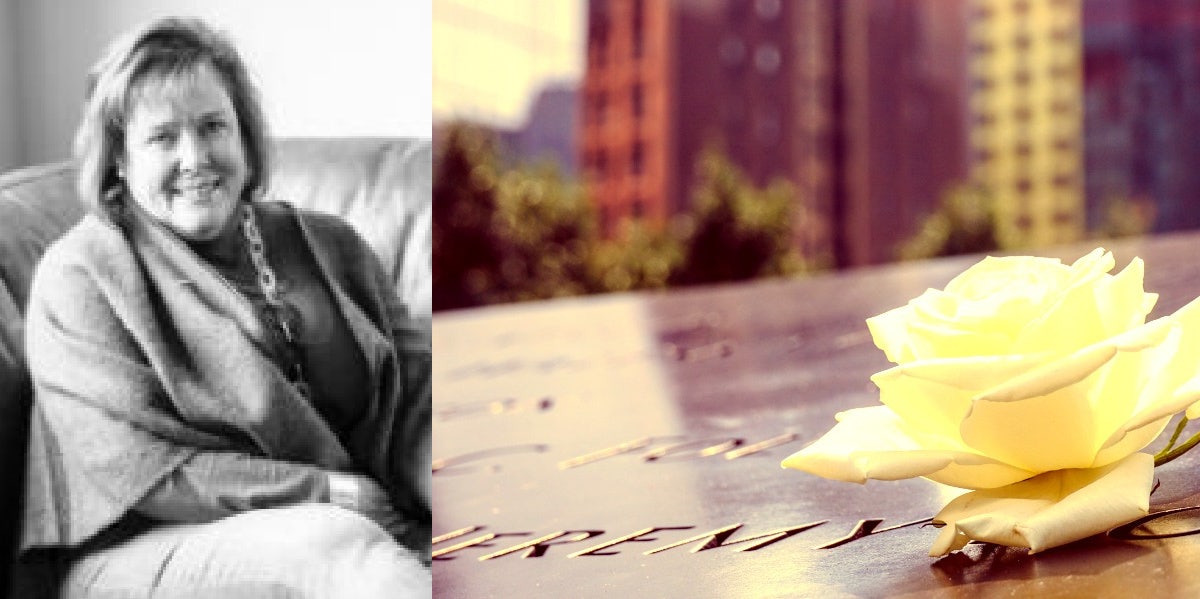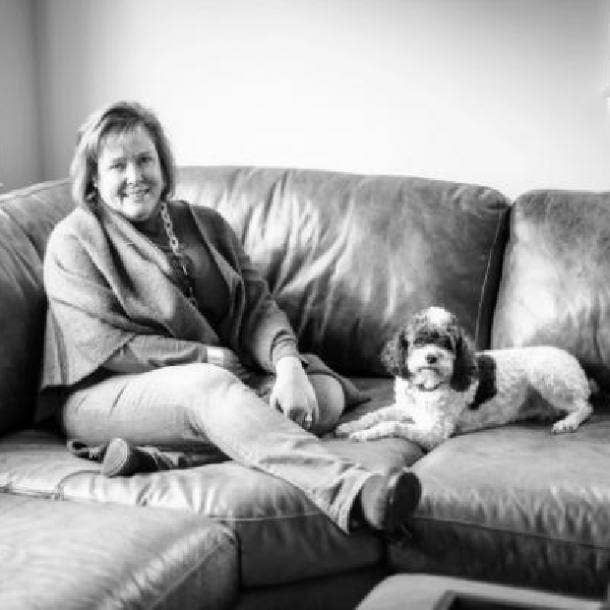
Virginia Buckingham learned there is hope, even when your soul feels shattered.
By Virginia Buckingham — Written on Sep 08, 2021
Photo: Virginia Buckingham and Stolnikphotography/Shutterstock

September has always been a month of endings and beginnings; changing seasons and new school years. For the past nineteen years this has also meant marking the anniversary of September 11, 2001 — the day our world was changed by 19 hijackers who took over four planes at almost exactly the same time, departing from three different airports, killing 2977 people.
I was in charge of one of those airports on that day.
Most of us have our own 9/11 stories. We know where we were, who we called when we saw the horrifying images on TV — some suddenly grieving the loss of a loved one, others rocked by a loss of a sense of safety on our shores.
My 9/11 story is different.
On September 11, 2001, I was the head of Boston’s Logan Airport, launching pad for the two planes which destroyed the World Trade Center — American Airlines Flight 11 and United Airlines Flight 175.
Because of my position as the director of Massport, the Massachusetts Port Authority, many people thought I was partially responsible for the 9/11 attacks. It took only 48 hours until the first news story appeared suggesting I might be fired in the wake of the hijackings.
RELATED: 'He's Still Here': A 9/11 Widow's Story Of Everlasting Love
A political and media firestorm ensued, headlines questioned my experience and Logan Airport security. TV reporters knocked on my front door, radio talk shows raged, political leaders held hearings and formed a blue-ribbon commission.
Six weeks later I was forced to resign, shattering the successful career I had built. Soon after, a 9/11 family sued me for wrongful death, asking a federal court to hold me personally responsible.
It shattered my heart and soul.
It took more than 13 years to gather all of my experiences into a memoir called On My Watch.
I wasn’t sure my story was worth telling. No one I knew personally died that day. I wasn’t part of the New York recovery effort or the federal response.
More than a story about rebuilding confidence in commercial aviation, mine is a story of rebuilding a broken life.
I offer my story and its lessons, in the hope that those navigating their own painful paths can draw from them.
It took many years for me to understand why I became the focus of blame and to stop blaming myself. I came to see that I was singled out and blamed because people needed to assert a sense of control over an unfathomable and terrifying event. For leaders, blaming me was an easy answer to a difficult question: How can we keep people safe?
However, blaming isn’t leadership. It doesn’t solve problems, it papers over them.
Being blamed for so many of the deaths on September 11th also sowed a seed of doubt in my own conscience.
For years, I questioned whether there was more I could have done and I looked for external sources of exoneration to tell me I was not to blame.
When the legal case against me was dropped and I was no longer being considered partially responsible for the September 11 attacks, I did not feel better.
Even when Logan itself was released from all lawsuits and the National Commission on Terrorist Attacks Upon the United States, also known as the 9/11 Commission, determined Logan’s security was no different than any other major airport's, I found it wasn’t enough.
No one, no external voice, was going to heal me from the pain of being blamed for those two planes being hijacked 9/11.
I had to be my own hero. I had to listen to my own inner voice, drowned out for too long by the noise of the crowd and a culture which turns to convenient scapegoats.
I learned to hold on to this truth: It was not my fault. It never was.
 Photo courtesy of the author
Photo courtesy of the author
RELATED: 20 Powerful 9/11 Quotes On The 20th Anniversary Of September 11, 2001
There were, though, some voices that reached me with a generosity of spirit that was humbling.
I have had the privilege of contact, even friendship, with some 9/11 families whose kindness and compassion served as a life raft. That they let me share my own grieving and share in their grief is a gift I can never repay.
So instead, I try to pay their compassion forward.
Their kindness and empathy helped me move forward — not on. This is an important distinction I have also learned in the past 19 years. Many people, loved ones and strangers alike, urged me to move on, to slam a metaphorical door on the past.
But I couldn’t do that, and it felt like I was failing at being strong and resilient.
What I know now is that “moving on” from such a traumatic event is not possible, whereas “moving forward” to build a new future, cognizant of its foundation of loss, is.
Related Stories From YourTango:
To me, that is a truer definition of resilience.
I live by the sea and collect pieces of sea glass at low tide. It bears no resemblance to the bottle that was originally tossed in the sea, breaking down over decades in the tumble of the waves and the salt and the sand. That bottle is changed forever, yet what it becomes is still of value, bringing beauty and meaning to those who find it.
Each year I am saddened but also heartened by the ceremonies, big and small, at monuments and in town squares, that honor the 9/11 families who lost loved ones that day.
We will never forget their profound loss nor the heroism of those who ran towards the danger to save others.
As I continue on a journey from 9/11 that is at times arduous and at times full of grace, I hold them in my heart, grateful for the realization that I am as resilient as sea glass.
I have listened to my own voice, and I have moved forward. My healing has come at its own time, at its own pace.
So, too, will yours.
RELATED: 8 Ways To Stop Living In The Past So You Can Move On With Your Life
Virginia Buckingham is a public affairs executive and a former editorial writer and columnist for the Boston Herald, as well as the author of the memoir, On My Watch. She served as chief of staff to two Massachusetts governors and was the first woman to run the Massachusetts Port Authority. Follow her on Twitter.
